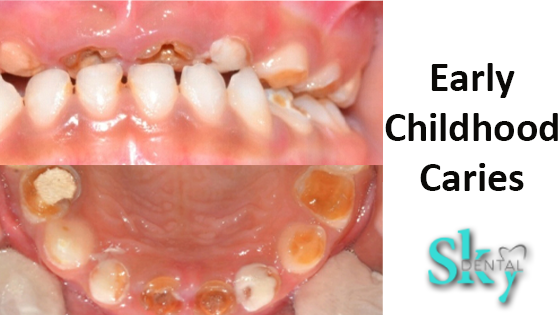What is Early Childhood Caries
Early Childhood caries (ECC) are cavities that are most commonly seen on a child’s upper front teeth and also affect other health. However, ECC is one of the prevalent diseases present in children who are below 6 years of age. It looks like white spots near the gum line. Initially, these spots are hard to find. But if they caught early, they can be stopped from getting worse. As the condition gets worse, they can look like brown spots or broken teeth. As a result, this requires more involved procedures to fix. So, treating Early childhood caries initially can stop the decay from getting worse.
What are the causes of Early Childhood Caries?
• Excess of sugar in foods and liquids like milk and juice can cause ECC.
• As a result, these sugars become the source for bacteria and also make acids that destroy a child’s teeth.
• Consequently, a plaque starts developing on the top of the cuticle.
• Oral hygiene, frequency of feedings, oral medications are also the other factors in causing Early childhood caries.
Risk Factors involved in ECC
Early childhood caries is a multifactorial disease. Sugary foods and liquids can lead to the cause of ECC. The other name for Early Childhood Caries is “baby bottle caries.”
• The feeding practices are the main risk factor in developing ECC. Because in this process the upper incisors and molars starts get affecting first. Similarly, the lower jaw molars and incisors also starts affecting.
Going to bed with the baby bottles filled with fruit juice or milk that contain sugar at a high level.
• Un-wiping of gums or without brushing the teeth before bedtime.
What are ways to prevent ECC?
One of the easiest ways to prevent early childhood caries is to avoid placing a bottle filled with milk, juice or sweet liquids to your child’s bed. Also, pediatricians recommend that all the children should be seen to a pediatric dentist at the age 1, when the lower and upper teeth the upper and lower front teeth began to appear. According to pediatrics, children who are having seven or eight months of age no longer need feeding during nights. Similarly, giving a bottle to your child when they are lying down may also place then at risk for getting early childhood caries.
Some of the other prevention methods are:
•Habituate your child to have a bottle during the meals. Also, don’t let them drink from it throughout the day.
•Serving healthy foods that do not contain a large amount of sugar in snacks and drinks can lessen the risk of getting ECC.
•Clean your baby’s gums with a soft toothbrush or cloth.
•Teach your child to start drinking from the cup as early as possible. Because drinking from the cup can pool the less liquid around the front teeth. As per the studies, Children who use bottles after 15 months of age or consume a high amount of sugary snacks and liquids are more prone to ECC.
•Scheduling regular dental visits and using fluoride toothpaste can decrease the risk of Early childhood caries.
How it can be treated?
If the ECC can notice early, then the cavities found in primary teeth can fill easily by a pediatric dentist. In case, in the need of extensive work, a pediatric dentist perform pulp therapies under local anaesthesia. Because, cavities can be very painful, so it is important to identify and treat them as soon as possible.
Home Care
• Need to follow Proper and perfect oral hygiene such as cleaning the infant’s teeth.
• Controlling the consumption of foods and liquids that contain sugar.
• Also, the child should be provided with a balanced diet as per the pediatrician guidance.
• Therefore, a child’s teeth should be periodically checked at home according to the directions of a dentist.
The most noteworthy point is the baby teeth are very essential for speaking and chewing. If your child loses teeth due to ECC, then your child’s permanent teeth may come in a crooked way. So, early childhood caries is completely ignorable and preventable with the help of parents and dentists. Proper oral habits ensure a lifetime of healthy smiles.


